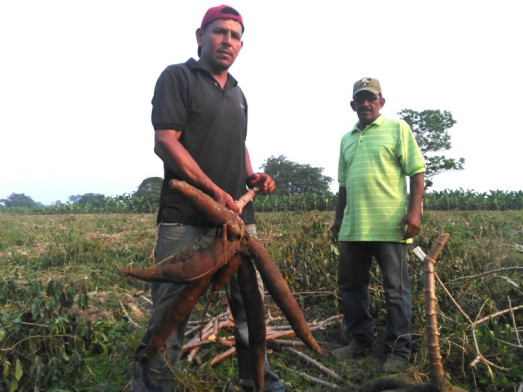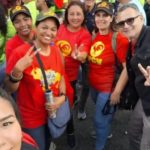BOLIVARIAN COUNTER-OFFENSIVE AND RACE AGAINST THE RIGHTWING CLOCK – Whether those on the right come from Venezuela or the transnationals, they see political stability as a problem. For political stability lets the Maduro government continue and deepen this stage of the revolution.
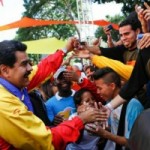
We publish below the summary of an article by Franco Vielma from the Venezuela Infos blog on 28.5.16. This piece shows well that the Revolution is not smashed in Venezuela; indeed it continues to progress through the raised but persuasive intervention of the government, and through the increasing power of the mass organisations , as in the Communal Cities (the featured image shows the Communal City of Florencio Ramirez, in the State of Merida/Zulia), and the CLAPs – under the leadership of the government and of the Socialist Party, PSUV.
The hatred of the bourgeois class – in Venezuela and internationally – comes from its realisation that humanity can now organise itself, in spite of all the imperialist attempts at penetration, violence, domination and predation.
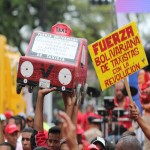
The Nicolas Maduro government allows the masses to take responsibility for their Revolution – and this allows the Revolution to continue and deepen. As the author says in this summary: this re-boots the economy of solidarity in Venezuela, and it re-vitalises the Chavista political project.
Please note that this is not a translation. The Posadiststoday recommend that any serious study of this matter bases itself on the Spanish and French originals, as per the details at the end of the page.
Posadiststoday, 17.6.2016
*************************
BOLIVARIAN COUNTER OFFENSIVE AND RACE AGAINST THE RIGHTWING IN VENEZUELA
Whether those on the right come from Venezuela or the transnationals, they see political stability as a problem. Political stability lets the Maduro government continue and deepen this stage of the revolution. To stop this happening, the right mounts economic shortages, offensives and political confrontations. It builds narratives of ‘social explosions’ and confronts the established institutions. It violates the rules of the National Electoral Council (CNE) to exert pressure for the abandonment of the rules1. It wants a speedy presidential recall-referendum to spread the cry of “humanitarian crisis” internationally – and call for foreign intervention.
Those right-wing putschists hope to complete their State coup this year, 2016, after 3 years of their harsh economic war worsened by the oil prices collapsing. It is in this economic field, however, that the Bolivarian counter-offensive lays down new foundations. It works for medium-term success. It is under this Maduro government, in the main, that the conditions have been created for economic improvement; and well the right-wing knows this.
What is the present situation like?
Price of oil: prices are recovering and may even stabilise around the 50 dollar-mark per barrel, according to the Brent and WTT indicators; this price is still low, but it is better than the continuation of the 10 or 20 dollar that would have bankrupted the industry, had it continued. Should the present price continue, the second semester will see an improvement.
Debt management: Although the country repays its debts without fail – 35 billion dollar repaid in 20 months – the rating agencies still label Venezuela ‘a risk country’. Rating of this sort have justified the financial blockading of the country. The Minister Miguel Perez Abad2 recently told Reuters that Venezuela is developing better conditions to repay, and that it has signed financial contracts with China. Last Tuesday, the Chinese Foreign Affairs Minister announced that he signed an accord of financial coordination with Venezuela. Perez Abad estimates that this alliance with China brings the necessary oxygen. He thinks the PDVSA (National Oil Company) can now raise the money needed to reorganise repayments, and lift the pressure on the country’s much depleted foreign currency reserves.
Investments for national production:
The government’s plan is to reduce imports and diversify exports. It has decided to practice a sort of financial acupuncture that directs capital towards the parts of the economy best able to improve food production and health. This policy too reduces the pressure on currency reserves. It makes speculation, fraud and economic war less likely. And it stimulates the creation of national products.
A distinct effort is made to boost national production throughout. As finance is provided where particular economic results are sought, more planning takes place in pragmatic ways. Economic management becomes more methodic. The State makes direct agreements in chosen sectors of the economy, be they large private enterprises, State enterprises, or entities in the Communal Cities.
Resources administered for results: The role of the State is to supervise and inspect the productive sectors rigorously, and it checks on the results. This way, it can control what happens at the level of foreign currency reserves. This way also, it can protect national production, improve greatly the level of supplies to the shops, and diversify the kind of articles that reach the market.
Taming the two-dollar tempest:
Due to speculation, fluctuations in DolarToday[1] have caused brutal damages but this has now levelled at 1,000 Bolivars[2] per dollar, and is rather losing strength.
Good crops should now follow the recent heavy rains: Two years of large-scale droughts have created havoc. Almost depleted barrages meant less electricity and less hours of electricity use; this should be stopping soon. Rain has an enormous importance in the production of strategic food supplies in Venezuela. A lot depends on irrigation too – rice and maize depend on the cyclical rains. The heavy rains this year are bound to improve production and distribution soon.
New price system: This controversial matter calls for the admission that prices have been kept artificially low for too long – more than ten years – by State subsidies, direct and indirect. Shortages are occurring particularly where the products are imported at the preferential dollar rate (another subsidy), explaining the price of 37 Bolivars for the famous Pantene (shampoo), or Colgate toothpaste at 40 Bolivars a tube, or Huggies (nappies) at 100 Bolivars.
Many people did not recognise the effort made by the State to protect the population with subsidies. Now that foreign money reserves have dwindled, the State can no longer afford the massive imports – particularly of raw materials – which it used to allow in the country; and it cannot maintain the same level of subsidies in the shops. Blood was spilt in the struggle against smuggling, hoarding and unreasonable large-scale subsidies. This contributed to the formation of micro-trading networks, long queues in shops and inequality in distribution.
The price of goods is now allowed to find its level; goods most affected are those that used to be trafficked. Raised prices have become an incentive to national production, and more goods circulating therefore. In some cases, the subsidies are not entirely removed but adjusted. Perez Abad reckons that this will bear fruits in the second half of this year.
The Local Committees for Supply and Production (CLAPs):
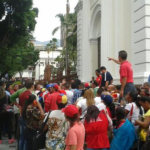
Economic sabotage has benefitted some people who now see a threat to themselves in all this transformation.
In the popular areas, Local Committees for Supply and Production (the CLAPs) and Communal Councils have been set up.
The speed at which the products reach the CLAPs is increasing; now that the CLAPs are official bodies, they are improving much. Thousands of tons of additional goods are being distributed every week by the CLAPs.
This new method lessens the inequalities; it diminishes the irregularities, and it curtails speculation on most essential goods.
After three years of economic war in Venezuela, the CLAPs are not the definitive and total solution, but their contribution helps enormously in the fight against economic chaos.
They are important also for their impact beyond the strictly economic sphere.
They re-boot the economy of solidarity, the economy at the service to the population; they re-vitalise the Chavista political project. They surmount the cannibalistic logic of the economy in the grip of war.
They make State governance weigh through participative mechanisms of distribution. This lets the people play a vital role in the counter-offensive.
- Franco Vielma – 28 May 2016 on blog Venezuela Infos : http://venezuelainfos.wordpress.com/
- Source: http://misionverdad.com/la-guerra-en-venezuela/acelerar-el-conflicto-y-propiciar-el-golpe-antes-que-la-economia-mejore
- Traduction into French: Thierry Deronne
- URL of this article: http://wp.me/p2ahp2-2cd
[1] DolarToday is a company that publishes exchange rate references in Latin America and Venezuela through a website. It rates the Venezuelan economy.
[2] One Venezuelan Bolivar equals approx. 0.01 US dollar.
